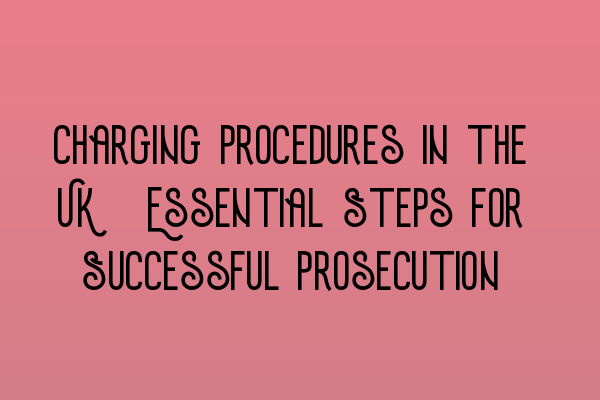Charging Procedures in the UK: Essential Steps for Successful Prosecution
Welcome to our blog post on charging procedures in the UK. In this article, we will guide you through the essential steps for successful prosecution, ensuring that you are well-prepared and equipped to navigate the intricacies of the criminal justice system.
The Importance of Proper Charging Procedures
Before we delve into the details of charging procedures, it is crucial to understand their significance. The charging stage is the foundation of any criminal prosecution and can significantly impact the outcome of a case. It is essential to follow proper procedures to ensure a fair trial and secure justice for all parties involved.
Step 1: Investigation and Gathering Evidence
The first step in the charging process is the investigation. Law enforcement officers and authorities gather evidence to build a strong case against the accused. This evidence may include witness testimony, physical evidence, expert opinions, or other relevant documentation.
To effectively gather evidence, it is essential to follow proper investigative techniques and ensure that all relevant information is collected. This may involve interviewing witnesses, conducting searches, or utilizing forensic analysis techniques. Our SQE 1 Practice Exam Questions and SQE 1 Practice Mocks FLK1 FLK2 articles provide invaluable resources for honing your investigative skills.
Step 2: Evaluating the Evidence
Once the evidence has been collected, it is crucial to evaluate its strength and relevance to the case. This evaluation process helps determine whether there is sufficient evidence to proceed with a prosecution.
Legal professionals must carefully assess the weight of the evidence, identify any weaknesses or potential challenges, and decide whether the prosecution is in the public interest. Our SQE 2 Preparation Courses article provides comprehensive guidance on how to effectively evaluate evidence and make informed decisions.
Step 3: Making the Charging Decision
The next step is the charging decision, where the prosecution must determine the appropriate charges to bring against the accused. This decision is based on the evidence gathered during the investigation and the evaluation process.
It is vital to choose the charges that accurately reflect the alleged crimes committed and can be adequately proven in court. Our SQE 1 Preparation Courses offer comprehensive training to help you develop the necessary skills to make sound charging decisions.
Step 4: Drafting and Issuing the Charge
Once the charging decision has been made, the next step is to draft and issue the charge. This involves preparing the necessary legal documentation, including the charge sheet, which outlines the specific charges brought against the accused.
It is crucial to ensure that the charge is clear, concise, and accurately reflects the allegations. Any ambiguities or inaccuracies in the charge can lead to complications during the trial. Our article on SRA SQE Exam Dates provides valuable information on the timelines involved in issuing charges and other important dates in the examination process.
Step 5: The First Court Appearance
After the charge has been issued, the accused will make their first court appearance. During this hearing, the charge will be read out in court, and the accused will have the opportunity to enter a plea. This initial court appearance sets the stage for further proceedings and helps determine the direction of the case.
Properly preparing for the first court appearance is essential, as it sets the tone for the entire trial. Understanding the importance of this step and the subsequent court proceedings is crucial for successful prosecution.
In Conclusion
Charging procedures in the UK are a critical element of the criminal justice system. Following the essential steps outlined in this article will ensure that you are well-equipped to navigate the charging process and achieve successful prosecutions.
For further assistance in your preparation for the SQE exams or to gain a deeper understanding of criminal law and practice in the UK, we invite you to explore our related articles and courses:
